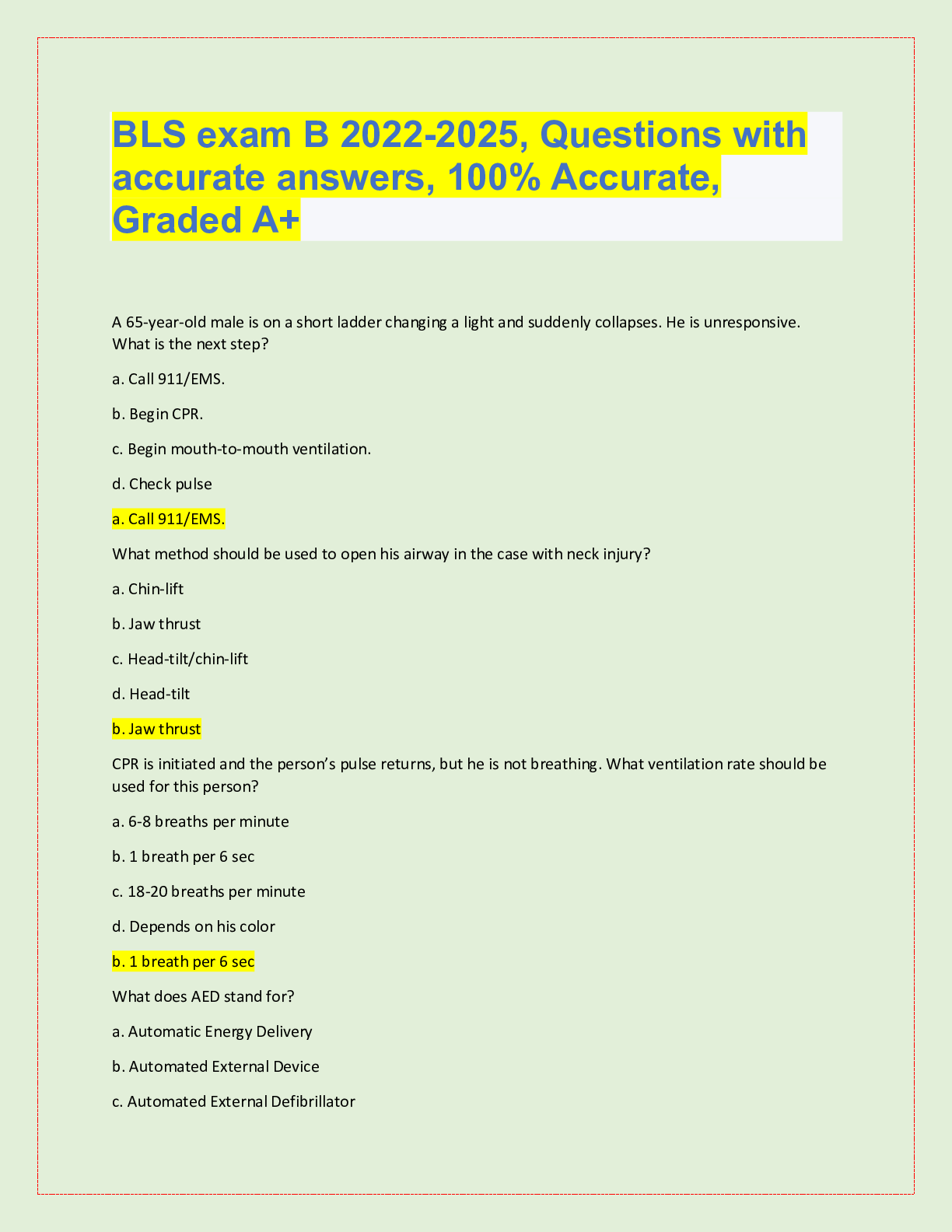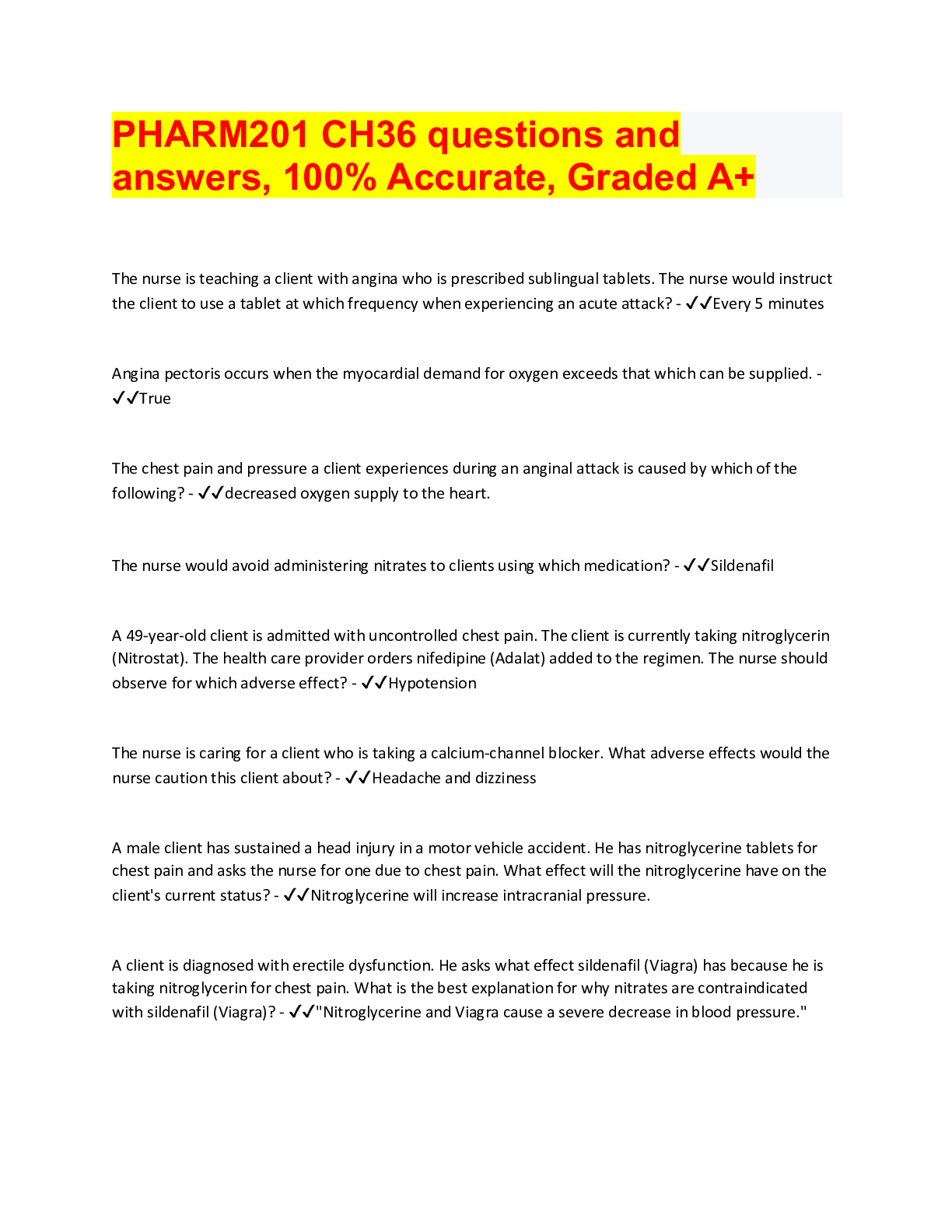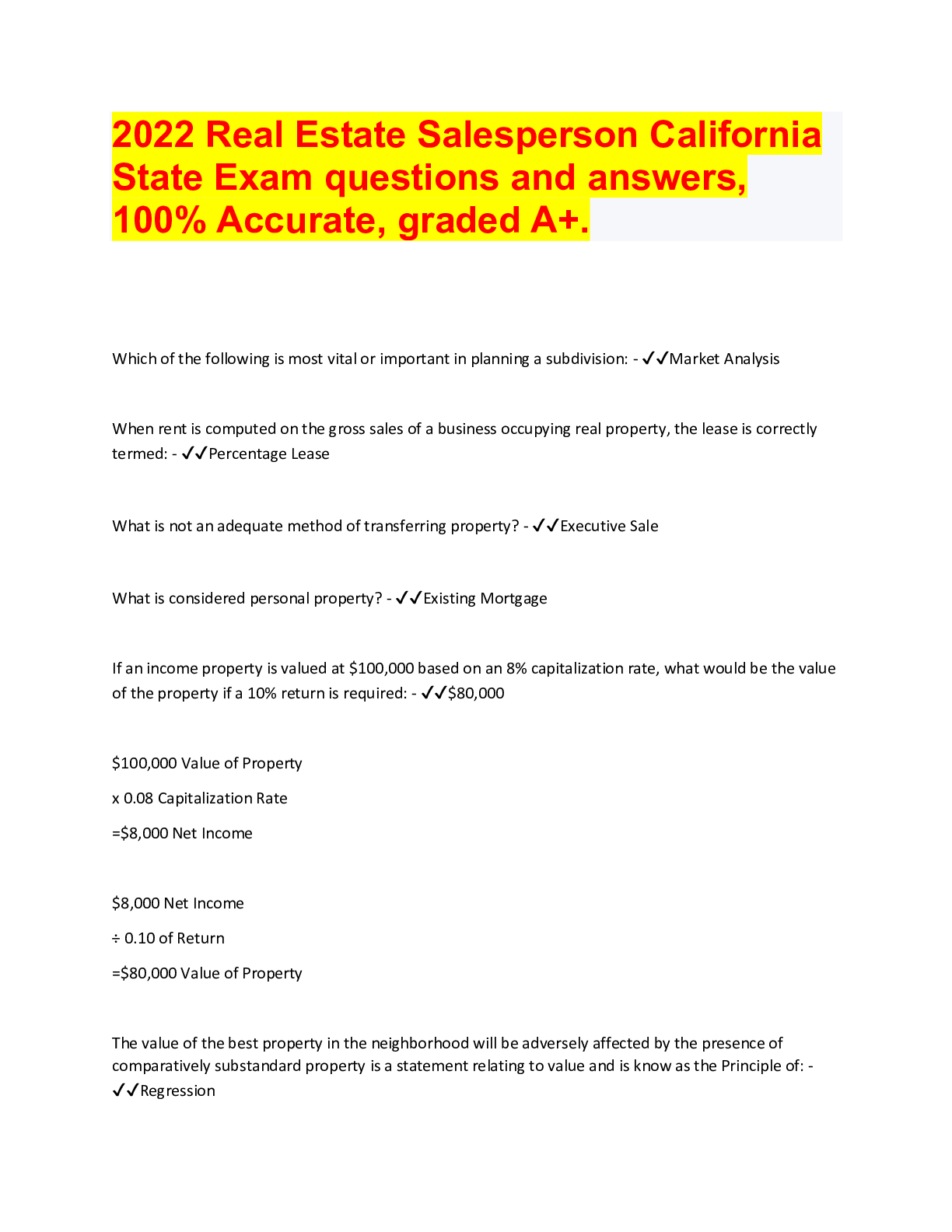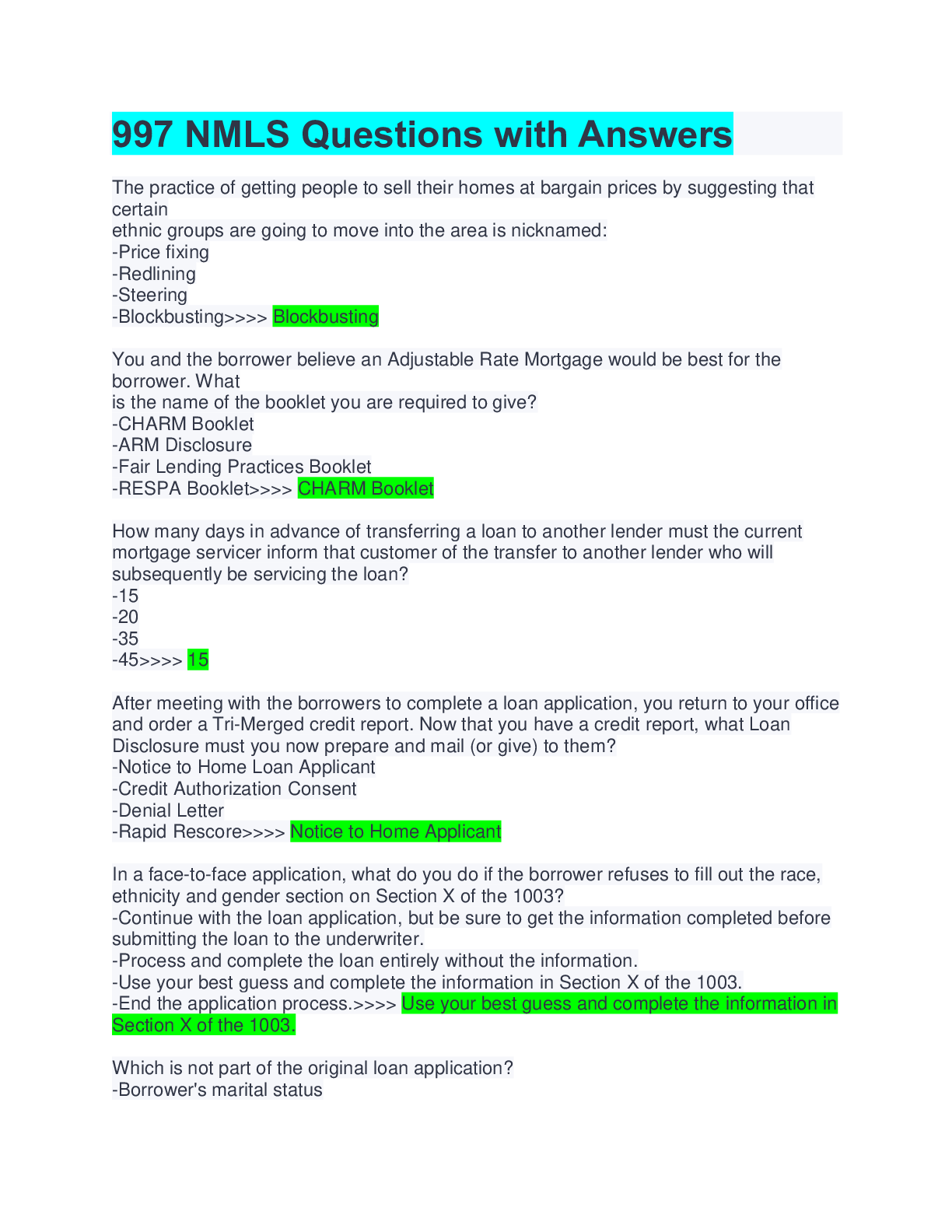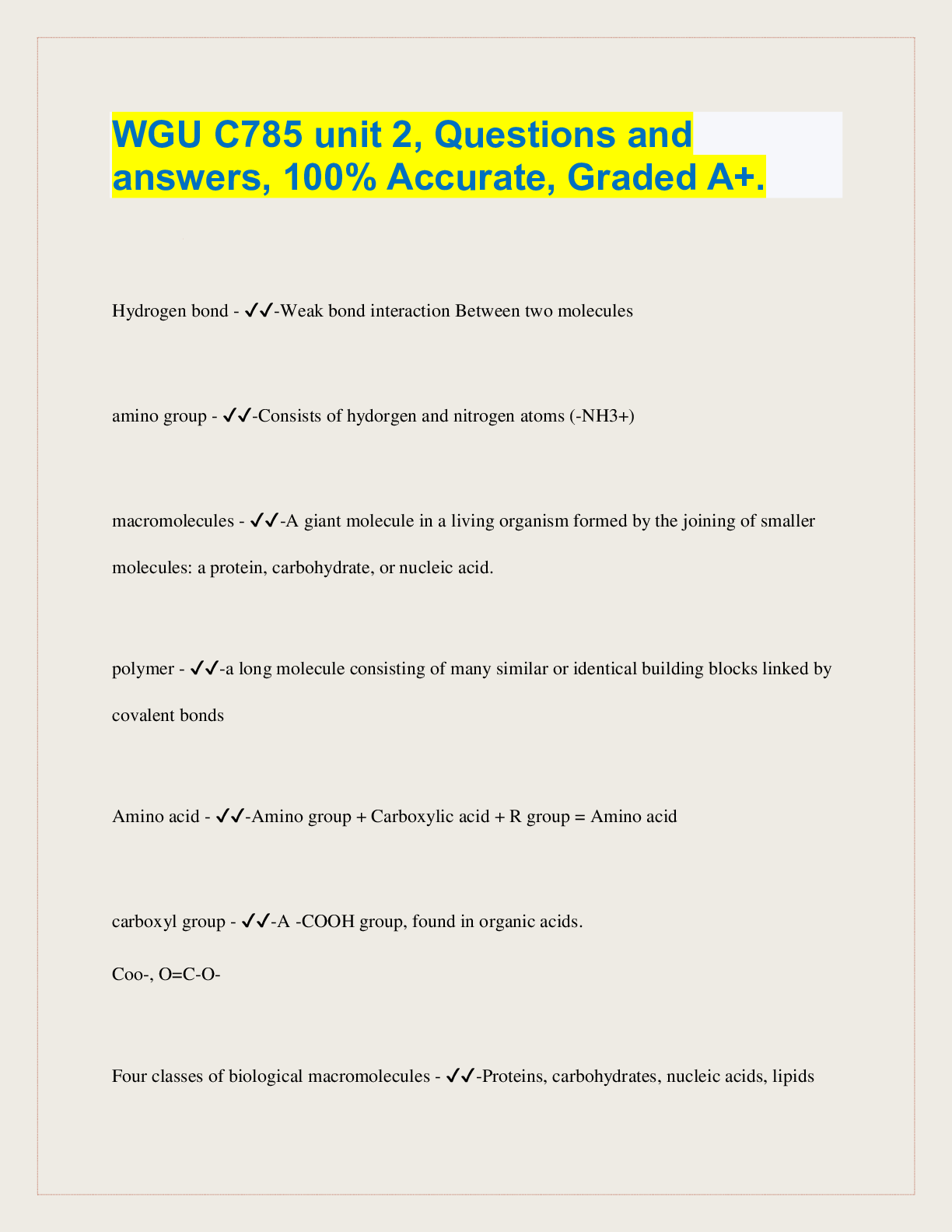History > QUESTIONS & ANSWERS > AP World History, Question & Answer, 100% Accurate, graded A+ (All)
AP World History, Question & Answer, 100% Accurate, graded A+
Document Content and Description Below
AP World History, Question & Answer, 100% Accurate, graded A+ Abbasid Caliphate - ✔✔-Descendants of the Prophet Muhammad's uncle, al-Abbas, the Abbasids overthrew the Umayyad Caliphate and ru... led an Islamic empire from their capital in Baghdad (founded 762) from 750 to 1258. (p. 234) absolution - ✔✔-The theory popular in France and other early modern European monarchies that royal power should be free of constitutional checks. (p. 452) Acheh Sultanate - ✔✔-Muslim kingdom in northern Sumatra. Main center of Islamic expansion in Southeast Asia in the early seventeenth century, it declined after the Dutch seized Malacca from Portugal in 1641. (p. 541) acllas - ✔✔-Women selected by Inca authorities to serve in religious centers as weavers and ritual participants. (p. 318) Aden - ✔✔-Port city in the modern south Arabian country of Yemen. It has been a major trading center in the Indian Ocean since ancient times. (p. 385) Adolf Hitler - ✔✔-Born in Austria, Hitler became a radical German nationalist during World War I. He led the National Socialist German Workers' Party-the Nazi Party-in the 1920s and became dictator of Germany in 1933. He led Europe into World War II. (p. 786) African National Congress - ✔✔-An organization dedicated to obtaining equal voting and civil rights for black inhabitants of South Africa. Founded in 1912 as the South African Native National Congress, it changed its name in 1923. Eventually brought equality (809) Afrikaners - ✔✔-South Africans descended from Dutch and French settlers of the seventeenth century. Their Great Trek founded new settler colonies in the nineteenth century. Though a minority among South Africans, they held political power after 1910. (735) Agricultural Revolution - ✔✔-The change from food gathering to food production that occurred between ca. 8000 and 2000 B.C.E. Also known as the Neolithic Revolution. (p. 17) agricultural revolution - ✔✔-The transformation of farming that resulted in the eighteenth century from the spread of new crops, improvements in cultivation techniques and livestock breeding, and consolidation of small holdings into large farms from which tenants were expelled (600) Akbar - ✔✔-Most illustrious sultan of the Mughal Empire in India (r. 1556-1605). He expanded the empire and pursued a policy of conciliation with Hindus. (p. 536) Akhenaten - ✔✔-Egyptian pharaoh (r. 1353-1335 B.C.E.). He built a new capital at Amarna, fostered a new style of naturalistic art, and created a religious revolution by imposing worship of the sun-disk. (p.66) Albert Einstein - ✔✔-German physicist who developed the theory of relativity, which states that time, space, and mass are relative to each other and not fixed. (p. 774) Aleandria - ✔✔-City on the Mediterranean coast of Egypt founded by Alexander. It became the capital of the Hellenistic kingdom of the Ptolemies. It contained the famous Library and the Museum-a center for leading scientific and literary figures. (138) Alexander - ✔✔-King of Macedonia in northern Greece. Between 334 and 323 B.C.E. he conquered the Persian Empire, reached the Indus Valley, founded many Greek-style cities, and spread Greek culture across the Middle East. Later known as Alexander the Great. (p. 136) Alexander Nevski - ✔✔-Prince of Novgorod (r. 1236-1263). He submitted to the invading Mongols in 1240 and received recognition as the leader of the Russian princes under the Golden Horde. (p. 339) All-India Muslim League - ✔✔-Political organization founded in India in 1906 to defend the interests of India's Muslim minority. Led by Muhammad Ali Jinnah, it attempted to negotiate with the Indian National Congress. Demanded Pakistan (813) Anasazi - ✔✔-Important culture of what is now the southwest (1000-1300 C.E.). Centered on Chaco Canyon in New Mexico and Mesa Verde in Colorado, the Anasazi culture built multistory residences and worshipped in subterranean buildings called kivas. (pg 308) aqueduct - ✔✔-A conduit, either elevated or under ground, using gravity to carry water from a source to a location-usually a city-that needed it. The Romans built many aqueducts in a period of substantial urbanization. (p. 156) Arawak - ✔✔-Amerindian peoples who inhabited the Greater Antilles of the Caribbean at the time of Columbus. (p. 423) Armenia - ✔✔-One of the earliest Christian kingdoms, situated in eastern Anatolia and the western Caucasus and occupied by speakers of the Armenian language. (p. 221) Asante - ✔✔-African kingdom on the Gold Coast that expanded rapidly after 1680. Asante participated in the Atlantic economy, trading gold, slaves, and ivory. It resisted British imperial ambitions for a quarter century before being absorbed into Britain. 1902 (736) Ashikaga Shogunate - ✔✔-The second of Japan's military governments headed by a shogun (a military ruler). Sometimes called the Muromachi Shogunate. (p. 365) Ashoka - ✔✔-Third ruler of the Mauryan Empire in India (r. 270-232 B.C.E.). He converted to Buddhism and broadcast his precepts on inscribed stones and pillars, the earliest surviving Indian writing. (p. 184) Ashur - ✔✔-Chief deity of the Assyrians, he stood behind the king and brought victory in war. Also the name of an important Assyrian religious and political center. (p. 94) Asian Tigers - ✔✔-Collective name for South Korea, Taiwan, Hong Kong, and Singapore-nations that became economic powers in the 1970s and 1980s. (p. 861) Atahualpa - ✔✔-Last ruling Inca emperor of Peru. He was executed by the Spanish. (p. 438) Atlantic System - ✔✔-The network of trading links after 1500 that moved goods, wealth, people, and cultures around the Atlantic Ocean basin. (p. 497) Augustus - ✔✔-Honorific name of Octavian, founder of the Roman Principate, the military dictatorship that replaced the failing rule of the Roman Senate. (151) Auschwitz - ✔✔-Nazi extermination camp in Poland, the largest center of mass murder during the Holocaust. Close to a million Jews, Gypsies, Communists, and others were killed there. (p. 800) autocracy - ✔✔-The theory justifying strong, centralized rule, such as by the tsar in Russia or Haile Selassie in Ethiopia. The autocrat did not rely on the aristocracy or the clergy for his or her legitimacy. (p. 553) Ayatollah Ruhollah Khomeini - ✔✔-Shi'ite philosopher and cleric who led the overthrow of the shah of Iran in 1979 and created an Islamic republic. (p. 859) ayllu - ✔✔-Andean lineage group or kin-based community. (p. 312) Aztecs - ✔✔-Also known as Mexica, the Aztecs created a powerful empire in central Mexico (1325-1521 C.E.). They forced defeated peoples to provide goods and labor as a tax. (p. 305) Babylon - ✔✔-The largest and most important city in Mesopotamia. It achieved particular eminence as the capital of the Amorite king Hammurabi in the eighteenth century B.C.E. and the Neo-Babylonian king Nebuchadnezzar in the sixth century B.C.E. (p. 29) balance of power - ✔✔-The policy in international relations by which, beginning in the eighteenth century, the major European states acted together to prevent any one of them from becoming too powerful. (p. 455) Balfour Declaration - ✔✔-Statement issued by Britain's Foreign Secretary Arthur Balfour in 1917 favoring the establishment of a Jewish national homeland in Palestine. (p. 761) Balfour Declaration - ✔✔-Statement issued by Britain's Foreign Secretary Arthur Balfour in 1917 favoring the establishment of a Jewish national homeland in Palestine. (p. 761) Bannermen - ✔✔-Hereditary military servants of the Qing Empire, in large part descendants of peoples of various origins who had fought for the founders of the empire. (p. 684) Bantu - ✔✔-Collective name of a large group of sub-Saharan African languages and of the peoples speaking these languages. (p. 219) Bartolome de Las Casas - ✔✔-First bishop of Chiapas, in southern Mexico. He devoted most of his life to protecting Amerindian peoples from exploitation. His major achievement was the New Laws of 1542, which limited the ability of Spanish settlers to compel Amerindians to labor, (476 Bartolomeu Dias - ✔✔-Portuguese explorer who in 1488 led the first expedition to sail around the southern tip of Africa from the Atlantic and sight the Indian Ocean. (p. 428) Batavi - ✔✔-Fort established ca.1619 as headquarters of Dutch East India Company operations in Indonesia; today the city of Jakarta. (p. 543) Battle of Midway - ✔✔-U.S. naval victory over the Japanese fleet in June 1942, in which the Japanese lost four of their best aircraft carriers. It marked a turning point in World War II. (p. 795) Battle of Omdurman - ✔✔-British victory over the Mahdi in the Sudan in 1898. General Kitchener led a mixed force of British and Egyptian troops armed with rapid-firing rifles and machine guns. (p. 730) Beijing - ✔✔-China's northern capital, first used as an imperial capital in 906 and now the capital of the People's Republic of China. (p. 351) Bengal - ✔✔-Region of northeastern India. It was the first part of India to be conquered by the British in the eighteenth century and remained the political and economic center of British India throughout the nineteenth century.(812) Benito Mussolini - ✔✔-Fascist dictator of Italy (1922-1943). He led Italy to conquer Ethiopia (1935), joined Germany in the Axis pact (1936), and allied Italy with Germany in World War II. He was overthrown in 1943 when the Allies invaded Italy. (p. 786) Benjamin Franklin - ✔✔-American intellectual, inventor, and politician He helped to negotiate French support for the American Revolution. (p. 577) Berlin Conference - ✔✔-Conference that German chancellor Otto von Bismarck called to set rules for the partition of Africa. It led to the creation of the Congo Free State under King Leopold II of Belgium. (See also Bismarck, Otto von.) (p. 732) Bhagavad-Gita - ✔✔-The most important work of Indian sacred literature, a dialogue between the great warrior Arjuna and the god Krishna on duty and the fate of the spirit. (p. 185) Black Death - ✔✔-An outbreak of bubonic plague that spread across Asia, North Africa, and Europe in the mid-fourteenth century, carrying off vast numbers of persons. (p. 397) Blaise Diagne - ✔✔-Senegalese political leader. He was the first African elected to the French National Assembly. During World War I, in exchange for promises to give French citizenship to Senegalese, he helped recruit Africans to serve in the French army. (809) Bolsheviks - ✔✔-Radical Marxist political party founded by Vladimir Lenin in 1903. Under Lenin's leadership, the Bolsheviks seized power in November 1917 during the Russian Revolution. (See also Lenin, Vladimir.) (p. 761) Borobodur - ✔✔-A massive stone monument on the Indonesian island of Java, erected by the Sailendra kings around 800 C.E. The winding ascent through ten levels, decorated with rich relief carving, is a Buddhist allegory for the progressive stages of enlightenment. (193) bourgeoisie - ✔✔-In early modern Europe, the class of well-off town dwellers whose wealth came from manufacturing, finance, commerce, and allied professions. (p. 459) breech loading rifle - ✔✔-Gun into which the projectiles had to be individually inserted. Later guns had magazines, a compartment holding multiple projectiles that could be fed rapidly into the firing chamber. (p. 681) British raj - ✔✔-The rule over much of South Asia between 1765 and 1947 by the East India Company and then by a British government. (p. 659) bubonic plague - ✔✔-A bacterial disease of fleas that can be transmitted by flea bites to rodents and humans; humans in late stages of the illness can spread the bacteria by coughing. High mortality rate and hard to contain. Disastrous. (280) Buddha - ✔✔-An Indian prince named Siddhartha Gautama, who renounced his wealth and social position. After becoming 'enlightened' (the meaning of Buddha) he enunciated the principles of Buddhism. (180) business cycle - ✔✔-Recurrent swings from economic hard times to recovery and growth, then back to hard times and a repetition of the sequence. (p. 615) Byzantine Empire - ✔✔-Historians' name for the eastern portion of the Roman Empire from the fourth century onward, taken from 'Byzantion,' an early name for Constantinople, the Byzantine capital city. The empire fell to the Ottomans in 1453. (250) caliphate - ✔✔-Office established in succession to the Prophet Muhammad, to rule the Islamic empire; also the name of that empire. (See also Abbasid Caliphate; Sokoto Caliphate; Umayyad Caliphate.) (p. 232) capitalism - ✔✔-The economic system of large financial institutions-banks, stock exchanges, investment companies-that first developed in early modern Europe. Commercial capitalism, the trading system of the early modern economy. (506) caravel - ✔✔-A small, highly maneuverable three-masted ship used by the Portuguese and Spanish in the exploration of the Atlantic. (p. 427) Carthage - ✔✔-City located in present-day Tunisia, founded by Phoenicians ca. 800 B.C.E. It became a major commercial center and naval power in the western Mediterranean until defeated by Rome in the third century B.C.E. (p. 107) Catholic Reformation - ✔✔-Religious reform movement within the Latin Christian Church, begun in response to the Protestant Reformation. It clarified Catholic theology and reformed clerical training and discipline. (p. 447) Cecil Rhodes Asante - ✔✔-British entrepreneur and politician involved in the expansion of the British Empire from South Africa into Central Africa. The colonies of Southern Rhodesia (now Zimbabwe) and Northern Rhodesia (now Zambia) were named after him. (p. 736) Celts - ✔✔-Peoples sharing a common language and culture that originated in Central Europe in the first half of the first millennium B.C.E.. After 500 B.C.E. they spread as far as Anatolia in the east, Spain and the British Isles in the west, onquered by Romans (90) Champa - ✔✔-A state formerly located in what is now southern Vietnam. It was hostile to Annam and was annexed by Annam and destroyed as an independent entity in 1500. (p. 366) Champa Rice - ✔✔-Quick-maturing rice that can allow two harvests in one growing season. Originally introduced into Champa from India, it was later sent to China as a tribute gift by the Champa state. (See also tributary system.) (p. 295) Chang'an - ✔✔-City in the Wei Valley in eastern China. It became the capital of the Zhou kingdom and the Qin and early Han Empires. Its main features were imitated in the cities and towns that sprang up throughout the Han Empire. >(p. 164) Charlemagne - ✔✔-King of the Franks (r. 768-814); emperor (r. 800-814). Through a series of military conquests he established the Carolingian Empire, which encompassed all of Gaul and parts of Germany and Italy. Illiterate, though started an intellectual revival. (250) Charles Darwin - ✔✔-English naturalist. He studied the plants and animals of South America and the Pacific islands, and in his book On the Origin of Species by Means of Natural Selection (1859) set forth his theory of evolution. (p. 715) chartered Company - ✔✔-Groups of private investors who paid an annual fee to France and England in exchange for a monopoly over trade to the West Indies colonies. (p. 498) Chav?n - ✔✔-The first major urban civilization in South America (900-250 B.C.E.). Its capital, Chav?n de Hu?ntar, was located high in the Andes Mountains of Peru. Chav?n became politically and economically dominant in a densely populated region. (89) Chiang Kai-Shek - ✔✔-General and leader of Nationalist China after 1925. Although he succeeded Sun Yat-sen as head of the Guomindang, he became a military dictator whose major goal was to crush the communist movement led by Mao Zedong. (p. 788) chiefdom - ✔✔-Form of political organization with rule by a hereditary leader who held power over a collection of villages and towns. Less powerful than kingdoms and empires, chiefdoms were based on gift giving and commercial links. (p. 311) Chimu - ✔✔-Powerful Peruvian civilization based on conquest. Located in the region earlier dominated by Moche. Conquered by Inca in 1465. (p. 314) chinampas - ✔✔-Raised fields constructed along lake shores in Mesoamerica to increase agricultural yields. (p. 301) Christopher Columbus - ✔✔-Genoese mariner who in the service of Spain led expeditions across the Atlantic, reestablishing contact between the peoples of the Americas and the Old World and opening the way to Spanish conquest and colonization. (p. 430) city-state - ✔✔-A small independent state consisting of an urban center and the surrounding agricultural territory. A characteristic political form in early Mesopotamia, Archaic and Classical Greece, Phoenicia, and early Italy. (p. 32) clipper ship - ✔✔-Large, fast, streamlined sailing vessel, often American built, of the mid-to-late nineteenth century rigged with vast canvas sails hung from tall masts. (p. 666) Cold War - ✔✔-The ideological struggle between communism (Soviet Union) and capitalism (United States) for world influence. The Soviet Union and the United States came to the brink of actual war during the Cuban missile crisis but never attacked one another. (831) colonialism - ✔✔-Policy by which a nation administers a foreign territory and develops its resources for the benefit of the colonial power. (p. 731) Columbian Exchange - ✔✔-The exchange of plants, animals, diseases, and technologies between the Americas and the rest of the world following Columbus's voyages. (p. 472) Confederation of 1867 - ✔✔-Negotiated union of the formerly separate colonial governments of Ontario, Quebec, New Brunswick, and Nova Scotia. This new Dominion of Canada with a central government in Ottawa is seen as the beginning of the Canadian nation.(p. 627) Confucius - ✔✔-Western name for the Chinese philosopher Kongzi (551-479 B.C.E.). His doctrine of duty and public service had a great influence on subsequent Chinese thought and served as a code of conduct for government officials.(p. 62) Congress of Vienna - ✔✔-Meeting of representatives of European monarchs called to reestablish the old order after the defeat of Napoleon I. (p. 594) conquistadors - ✔✔-Early-sixteenth-century Spanish adventurers who conquered Mexico, Central America, and Peru. (See Cort?s, Hern?n; Pizarro, Francisco.) (p. 436) Constantine - ✔✔-Roman emperor (r. 312-337). After reuniting the Roman Empire, he moved the capital to Constantinople and made Christianity a favored religion. (p.159) Constitutional Convention - ✔✔-Meeting in 1787 of the elected representatives of the thirteen original states to write the Constitution of the United States. (p. 583) constitutionalism - ✔✔-The theory developed in early modern England and spread elsewhere that royal power should be subject to legal and legislative checks. (p. 452) contract of indenture - ✔✔-A voluntary agreement binding a person to work for a specified period of years in return for free passage to an overseas destination. Before 1800 most indentured servants were Europeans; after 1800 most indentured laborers were Asians. (p. 670) Cossaks - ✔✔-Peoples of the Russian Empire who lived outside the farming villages, often as herders, mercenaries, or outlaws. Cossacks led the conquest of Siberia in the sixteenth and seventeenth centuries. (p. 552) cottage industries - ✔✔-Weaving, sewing, carving, and other small-scale industries that can be done in the home. The laborers, frequently women, are usually independent. (p. 353) cotton - ✔✔-The plant that produces fibers from which cotton textiles are woven. Native to India, cotton spread throughout Asia and then to the New World. It has been a major cash crop in various places, including early Islamic Iran, Yi Korea, Egypt, & US (363) Council of the Indes - ✔✔-The institution responsible for supervising Spain's colonies in the Americas from 1524 to the early eighteenth century, when it lost all but judicial responsibilities. (p. 476) coureurs de bois - ✔✔-(runners of the woods) French fur traders, many of mixed Amerindian heritage, who lived among and often married with Amerindian peoples of North America. (p. 489) creoles - ✔✔-In colonial Spanish America, term used to describe someone of European descent born in the New World. Elsewhere in the Americas, the term is used to describe all nonnative peoples. (p. 482) Crusades - ✔✔-Armed pilgrimages to the Holy Land by Christians determined to recover Jerusalem from Muslim rule. The Crusades brought an end to western Europe's centuries of intellectual and cultural isolation. (p. 270) Crystal Palace - ✔✔-Building erected in Hyde Park, London, for the Great Exhibition of 1851. Made of iron and glass, like a gigantic greenhouse, it was a symbol of the industrial age. (p. 606) Cuban Missile Crisis - ✔✔-Brink-of-war confrontation between the United States and the Soviet Union over the latter's placement of nuclear-armed missiles in Cuba. (p. 839) cultural imperialism - ✔✔-Domination of one culture over another by a deliberate policy or by economic or technological superiority. (p. 894) Cultural Revolution - ✔✔-Campaign in China ordered by Mao Zedong to purge the Communist Party of his opponents and instill revolutionary values in the younger generation.(p. 848) cuneiform - ✔✔-A system of writing in which wedge-shaped symbols represented words or syllables. It originated in Mesopotamia and was used initially for Sumerian and Akkadian but later was adapted to represent other languages of western Asia. Cyrus - ✔✔-Founder of the Achaemenid Persian Empire. Between 550 and 530 B.C.E. he conquered Media, Lydia, and Babylon. Revered in the traditions of both Iran and the subject peoples. dalai lama - ✔✔-Originally, a title meaning 'universal priest' that the Mongol khans invented and bestowed on a Tibetan lama (priest) in the late 1500s to legitimate their power in Tibet. Subsequently, the title of the religious and political leader of Tibet. (p. 556) Daoism - ✔✔-Chinese School of Thought: Daoists believe that the world is always changing and is devoid of absolute morality or meaning. They accept the world as they find it, avoid futile struggles, and deviate as little as possible from the Dao, or 'path' of nature. Darius I - ✔✔-Third ruler of the Persian Empire (r. 521-486 B.C.E.). He crushed the widespread initial resistance to his rule and gave all major government posts to Persians rather than to Medes. Declaration of the Rights of Man - ✔✔-Statement of fundamental political rights adopted by the French National Assembly at the beginning of the French Revolution. (p. 586) deforestation - ✔✔-The removal of trees faster than forests can replace themselves. (p. 462) Delhi Sulatanate - ✔✔-Centralized Indian empire of varying extent, created by Muslim invaders. (p. 374) democracy - ✔✔-system of government in which all 'citizens' (however defined) have equal political and legal rights, privileges, and protections, as in the Greek city-state of Athens in the fifth and fourth centuries B.C.E. (p. 127) Demographic Transition - ✔✔-A change in the rates of population growth. Before the transition, both birth and death rates are high, resulting in a slowly growing population; then the death rate drops but the birth rate remains high, causing a population explosion. (867) Deng Xiaoping - ✔✔-Communist Party leader who forced Chinese economic reforms after [Show More]
Last updated: 2 years ago
Preview 1 out of 89 pages
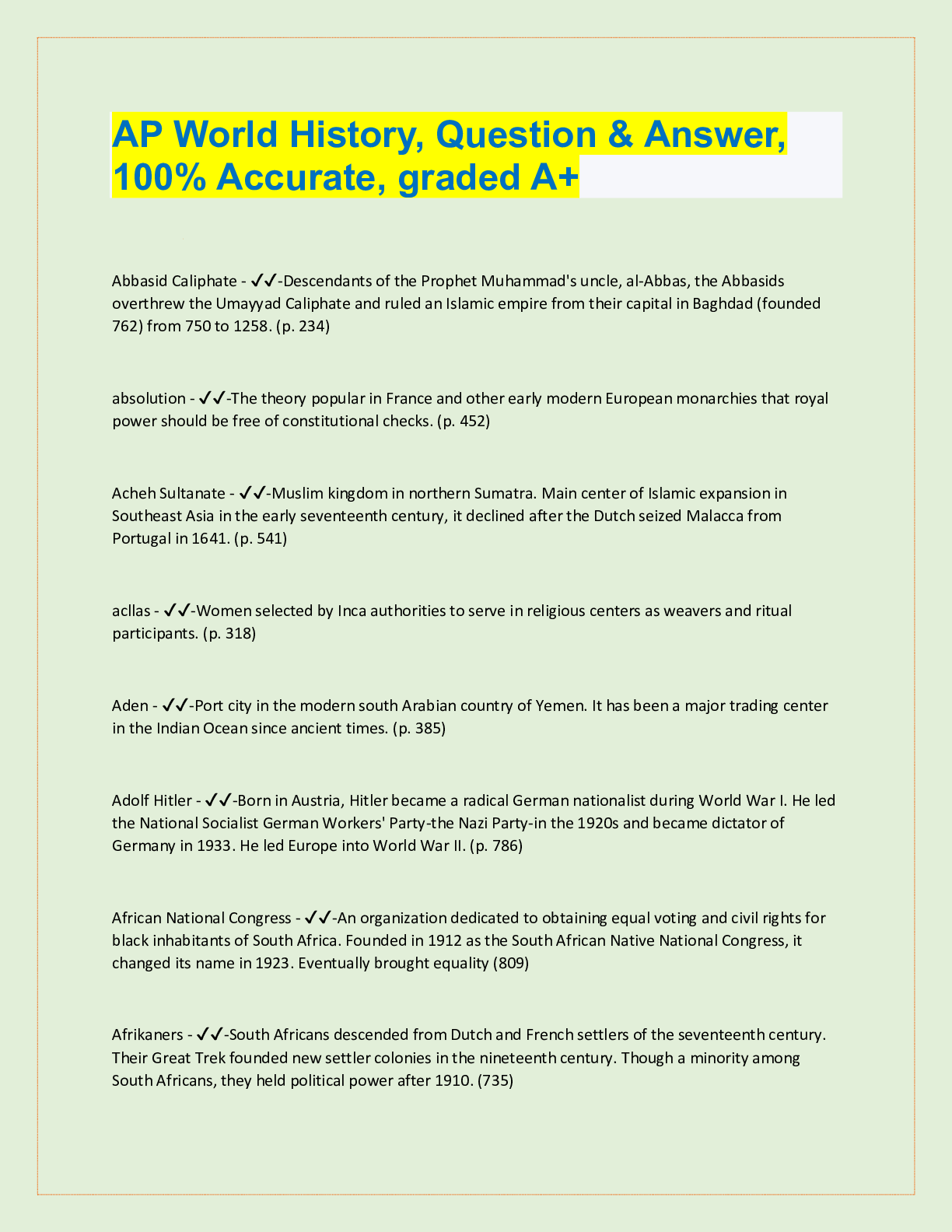
Buy this document to get the full access instantly
Instant Download Access after purchase
Buy NowInstant download
We Accept:

Also available in bundle (1)
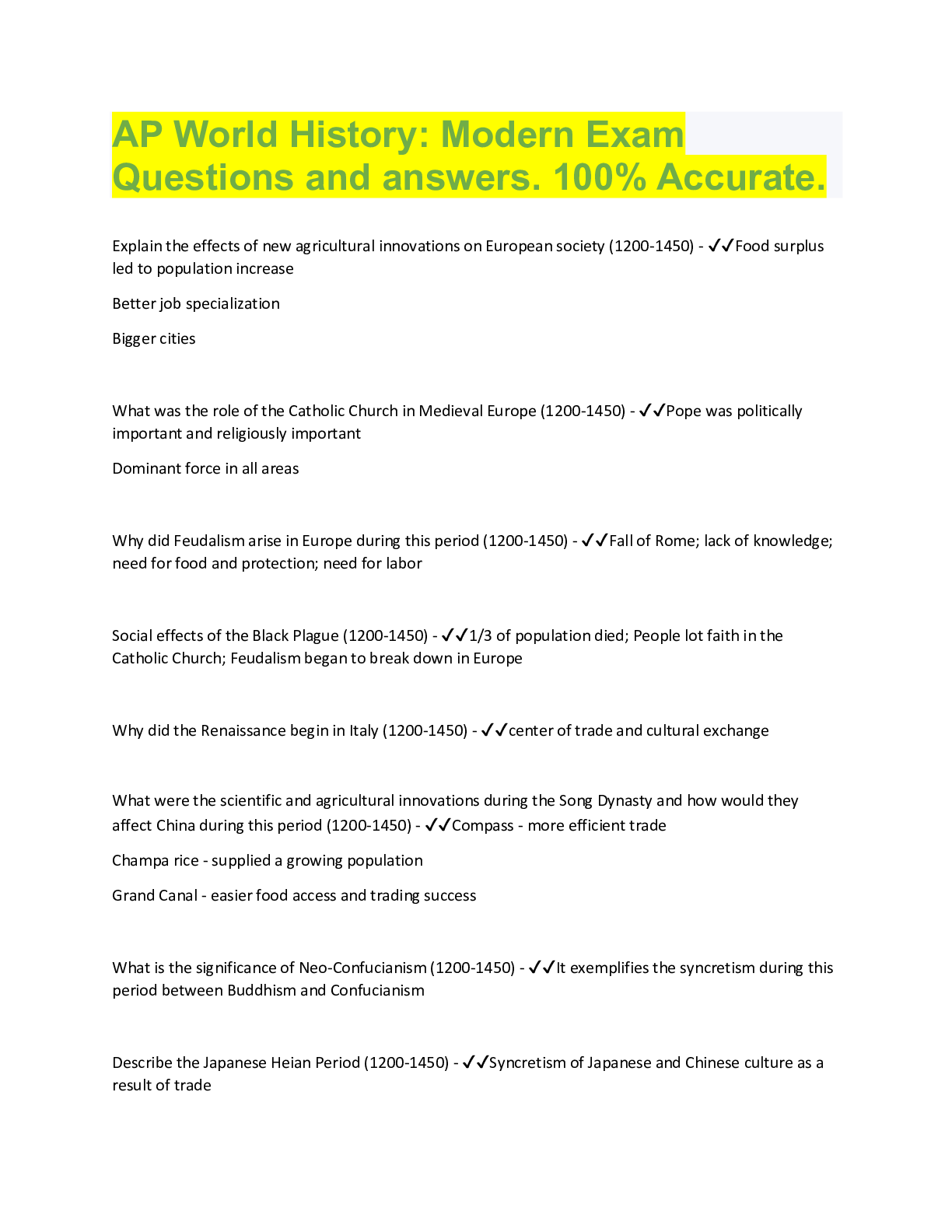
AP World History Exam BUNDLE, VERIFIED.
AP World History Exam Study Guide Questions and answers, 100% Accurate, graded A+. 25 VERSIONS, APPROVED
By Topmark 2 years ago
$34
28
Reviews( 0 )
$12.00
Can't find what you want? Try our AI powered Search
Document information
Connected school, study & course
About the document
Uploaded On
Mar 14, 2023
Number of pages
89
Written in
Additional information
This document has been written for:
Uploaded
Mar 14, 2023
Downloads
0
Views
73

